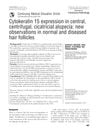 30 citations,
October 2016 in “Current research in translational medicine”
30 citations,
October 2016 in “Current research in translational medicine” Hair follicles on the scalp interact with and respond to the nervous system, influencing their own behavior and growth.
 30 citations,
September 2003 in “Experimental Dermatology”
30 citations,
September 2003 in “Experimental Dermatology” Minoxidil helps prevent stress-caused hair loss in mice.
 30 citations,
August 1983 in “Pediatric Clinics of North America”
30 citations,
August 1983 in “Pediatric Clinics of North America” Most hair loss in children is caused by a few common conditions, and it's important to diagnose these properly and support the child's mental health.
 28 citations,
September 2019 in “International Journal of Nanomedicine”
28 citations,
September 2019 in “International Journal of Nanomedicine” Minoxidil nanoparticles can potentially be a more effective treatment for hair growth than current treatments.
 27 citations,
January 2020 in “Experimental Dermatology”
27 citations,
January 2020 in “Experimental Dermatology” Immune cells affect hair growth and could lead to new hair loss treatments.
 27 citations,
August 2005 in “The journal of investigative dermatology/Journal of investigative dermatology”
27 citations,
August 2005 in “The journal of investigative dermatology/Journal of investigative dermatology” Researchers found new genes involved in hair growth, which could help develop new hair treatments.
 26 citations,
May 2019 in “PLOS ONE”
26 citations,
May 2019 in “PLOS ONE” Hair loss patients have different microbes in hair follicles, possibly affecting hair loss.
 26 citations,
October 2007 in “Experimental Dermatology”
26 citations,
October 2007 in “Experimental Dermatology” L-Carnitine-L-tartrate may help hair grow and prevent hair loss.
 25 citations,
September 2020 in “Molecules”
25 citations,
September 2020 in “Molecules” Quercitrin may help treat hair loss by promoting hair growth and improving cell health.
 25 citations,
July 2019 in “Experimental Dermatology”
25 citations,
July 2019 in “Experimental Dermatology” Cholesterol balance is important for hair health, and problems with it can lead to hair loss conditions.
 25 citations,
August 2010 in “Journal of Biological Chemistry”
25 citations,
August 2010 in “Journal of Biological Chemistry” Nuclear Factor I-C is important for controlling hair growth by affecting the TGF-β1 pathway.
 24 citations,
January 2015 in “Current problems in dermatology”
24 citations,
January 2015 in “Current problems in dermatology” The document concludes that accurate diagnosis of hair loss in children is crucial due to limited treatment options and the condition's psychological impact.
 23 citations,
February 2015 in “International Journal of Molecular Sciences”
23 citations,
February 2015 in “International Journal of Molecular Sciences” Colchicine can inhibit hair growth by affecting cell activity and protein expression in hair follicles.
 23 citations,
January 2002 in “Journal of Cutaneous Medicine and Surgery”
23 citations,
January 2002 in “Journal of Cutaneous Medicine and Surgery” Finasteride helps hair growth by decreasing cell death in hair follicles.
 22 citations,
July 2019 in “PLOS ONE”
22 citations,
July 2019 in “PLOS ONE” Skin lymphatic vessels are essential for hair growth.
 22 citations,
October 2018 in “Aesthetic Plastic Surgery”
22 citations,
October 2018 in “Aesthetic Plastic Surgery” Understanding hair follicle biology and stem cell control could lead to new hair loss treatments.
 22 citations,
January 2012 in “International Journal of Trichology”
22 citations,
January 2012 in “International Journal of Trichology” Miniaturized hairs stay connected to muscle in alopecia areata, allowing possible regrowth, but not in androgenetic alopecia.
 21 citations,
March 2019 in “Experimental Dermatology”
21 citations,
March 2019 in “Experimental Dermatology” Immune cells around hair follicles help control hair growth and could be targets for treating hair disorders.
 21 citations,
January 2002 in “Journal of Cutaneous Medicine and Surgery”
21 citations,
January 2002 in “Journal of Cutaneous Medicine and Surgery” Finasteride affects hair growth by changing caspase and XIAP levels, potentially treating hair diseases.
 21 citations,
May 1996 in “Current problems in dermatology”
21 citations,
May 1996 in “Current problems in dermatology” Detailed patient history and physical exams are crucial for diagnosing hair loss.
 19 citations,
August 2019 in “Expert Opinion on Therapeutic Targets”
19 citations,
August 2019 in “Expert Opinion on Therapeutic Targets” New treatments for hair loss may target specific pathways and generate new hair follicles.
 18 citations,
December 2020 in “Frontiers in cell and developmental biology”
18 citations,
December 2020 in “Frontiers in cell and developmental biology” miR-140-5p in certain cell vesicles helps hair growth by boosting cell proliferation.
 18 citations,
April 2013 in “Inflammatory Bowel Diseases”
18 citations,
April 2013 in “Inflammatory Bowel Diseases” People with Inflammatory Bowel Disease often lose hair due to stress, medication side effects, or lack of nutrients, and treatment depends on the specific cause.
 17 citations,
November 2012 in “Journal of Investigative Dermatology”
17 citations,
November 2012 in “Journal of Investigative Dermatology” The document concludes that over 500 genes are linked to hair disorders and this knowledge is important for creating new treatments.
 17 citations,
September 2012 in “Dermatologic Clinics”
17 citations,
September 2012 in “Dermatologic Clinics” The conclusion is that accurate diagnosis of different types of hair loss requires careful examination of tissue samples and understanding of clinical symptoms.
 16 citations,
December 2006 in “Expert Review of Dermatology”
16 citations,
December 2006 in “Expert Review of Dermatology” Hair follicles are essential for skin health, aiding in hair growth, wound healing, and immune function.
 14 citations,
January 2011 in “Journal of Cutaneous Pathology”
14 citations,
January 2011 in “Journal of Cutaneous Pathology” CK15 is not a reliable marker for stem cells in damaged hair follicles from patients with CCCA.
 13 citations,
December 2014 in “Stem Cells”
13 citations,
December 2014 in “Stem Cells” Hair and skin can regenerate without bulge stem cells due to other compensating cells.
 12 citations,
May 2014 in “International Journal of Molecular Medicine”
12 citations,
May 2014 in “International Journal of Molecular Medicine” Chrysanthemum zawadskii extract helps hair grow by stimulating hair cells.
 12 citations,
June 2009 in “Journal of Cosmetic Dermatology”
12 citations,
June 2009 in “Journal of Cosmetic Dermatology” Loose Anagen Hair syndrome occurs in dark-skinned children and often improves on its own.






























